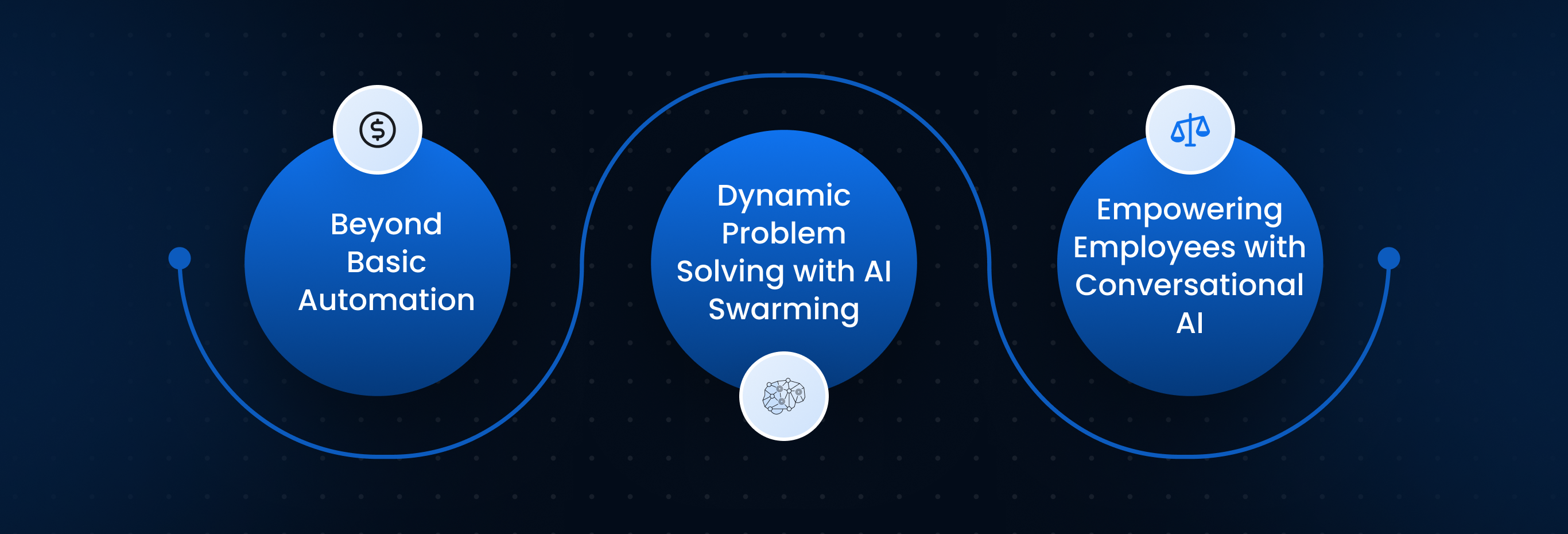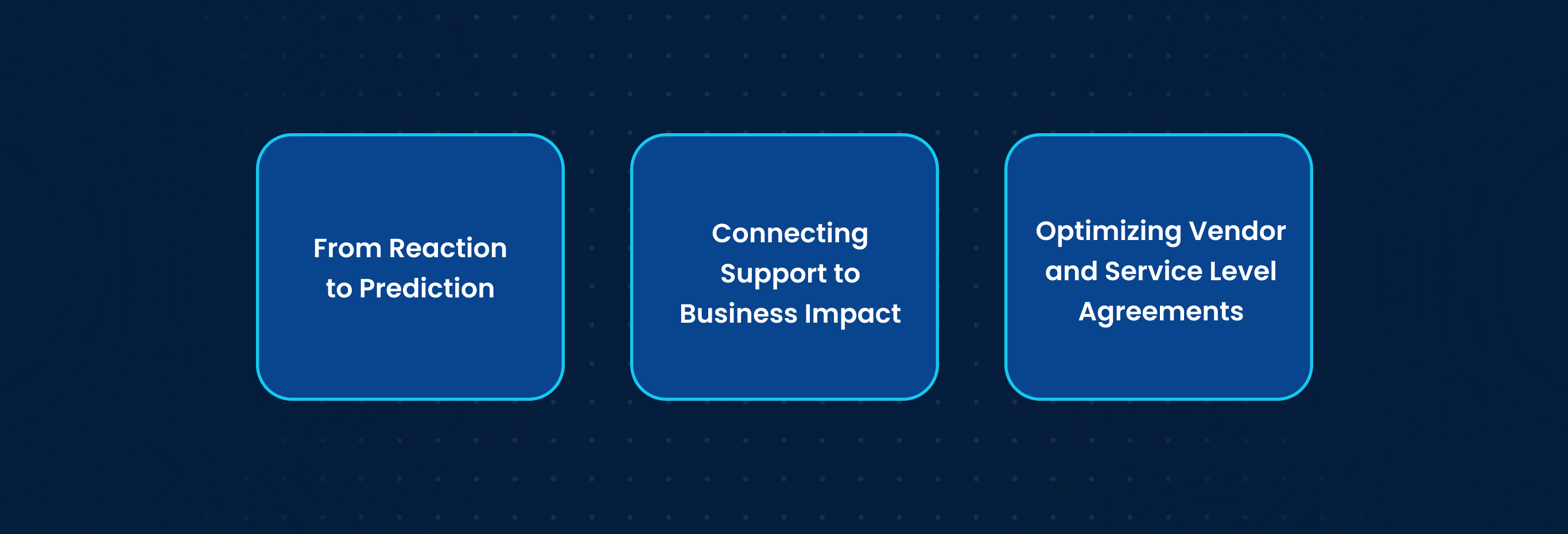Introduction
The future of work isn’t just arriving; it’s here, fundamentally reshaped by artificial intelligence. By 2025, AI in the workforce will have transitioned from an intriguing concept to an indispensable operational reality for large US enterprises. For technology leaders overseeing critical ticketing systems in IT, HR, and Finance, understanding this evolution isn’t merely about staying competitive; it’s about pioneering a new era of efficiency, employee empowerment, and strategic foresight.
We’re moving beyond basic automation. The conversation has shifted to hyper-intelligent systems that don’t just follow rules but learn, anticipate, and act autonomously. This profound transformation impacts every layer of your organization, from how employees get support to how your technology teams innovate.
Supercharging Support: The Evolution of Intelligent Ticketing
Ticketing systems have long been the backbone of enterprise support, yet they’ve often been perceived as reactive. In 2025, AI is not just enhancing these systems; it’s revolutionizing them. We’re witnessing a move from simple ticket routing to truly proactive and even preventative issue resolution.
-
Beyond Basic Automation: The real leap forward lies in systems that can predict user issues before they even arise. Imagine an intelligent agent observing patterns in system logs or user behavior, identifying a potential problem, and resolving it – perhaps by refreshing a connection or offering a quick fix – before a user even thinks to open a ticket. This shifts the paradigm towards a “zero-ticket” ideal for common problems, fundamentally reducing the daily noise for your teams.
-
Dynamic Problem Solving with AI Swarming: For more complex issues, the traditional tiered support model is evolving. AI-powered “swarming” dynamically assembles the right human experts and AI agents. This means that instead of a Level 1 agent escalating a ticket to Level 2, then Level 3, an intelligent system immediately brings together the necessary specialists and AI tools to tackle the problem collaboratively and efficiently. It’s like having a specialized task force assembled on demand, ensuring faster resolution.
-
Empowering Employees with Conversational AI: Generative AI is transforming self-service. No longer are employees sifting through static knowledge bases. Instead, they can interact with highly intelligent, conversational agents that understand natural language, learn from every interaction, and provide personalized, accurate guidance for IT, HR, and Finance inquiries. This significantly deflects routine queries, freeing up human agents for more intricate tasks.

The Symbiotic Workforce: Redefining Human-AI Collaboration
The fear that AI will replace jobs is giving way to the reality that AI will transform jobs. By 2025, a truly symbiotic workforce will be the standard, where artificial intelligence augments human capabilities, fostering a more productive and engaging environment.
- New Roles for Support Professionals: The role of the IT, HR, and Finance support professional is evolving. Their focus shifts from repetitive troubleshooting to higher-value activities: supervising AI agents, handling complex exceptions that require human judgment, and continuously improving the AI systems themselves. Consequently, your teams will transition from problem solvers to strategic facilitators of intelligent operations.
- Measuring True Value from AI: Quantifying the return on investment for AI in workforce augmentation goes beyond simple cost savings. We’re now measuring improvements in employee experience, the speed of resolution for critical issues, and the enhanced innovation capacity of teams who are no longer bogged down by mundane tasks. The qualitative benefits often outweigh the purely quantitative, fostering a more satisfied and engaged workforce.
- Accelerated Learning with Intelligent Assistants: AI is also playing a crucial role in internal training and development. Intelligent assistants can create personalized learning paths for new hires and existing employees, adapting to their performance and the evolving demands of your technology stack. This ensures your workforce remains agile and skilled.
Governing Intelligent Agents: Ensuring Trust and Transparency
As we integrate more AI into daily operations, especially in sensitive areas like HR and Finance, questions of governance, ethics, and responsible scaling become paramount. Trust in AI is built on transparency and careful management.
- Ethical AI in Employee Interactions: It is vital to ensure fairness and mitigate bias in AI-powered systems that interact with employees, particularly when those systems inform task allocation or provide performance insights. Establishing robust ethical frameworks for AI governance is not just a best practice; it’s a foundational necessity for maintaining employee trust and legal compliance.
- Securing Data in the AI Era: The proliferation of generative AI necessitates heightened data privacy and security measures. Leaders must understand how these advanced systems handle sensitive employee and customer data within ticketing and support workflows. This involves implementing cutting-edge security protocols and ensuring strict adherence to compliance regulations, like those concerning personal identifiable information.
- Explainable AI for Confidence: When an AI agent provides a recommendation or takes an action, it’s crucial for human employees to understand the reasoning behind it. “Explainable AI” is emerging as a critical component, allowing systems to articulate their logic in clear, comprehensible terms. This transparency builds confidence in AI-driven decisions and enables effective human oversight.
Strategic Foresight: Leveraging Ticketing Data with AI
Your ticketing systems are rich reservoirs of operational data. AI is the key to unlocking their full strategic potential, moving beyond reactive problem-solving to proactive, predictive insights that inform broader business strategy.
- From Reaction to Prediction: Imagine an AI analyzing thousands of past tickets, identifying subtle patterns, and predicting potential system outages or widespread user issues before they impact productivity. This predictive capability allows IT teams to shift from firefighting to strategic planning, proactively addressing vulnerabilities or anticipating infrastructure needs.
- Connecting Support to Business Impact: AI can correlate IT, HR, and Finance support data with core business metrics. This means demonstrating how efficient ticket resolution directly impacts employee productivity, customer satisfaction scores, and even bottom-line revenue. Understanding these linkages elevates the strategic importance of your support functions within the enterprise.
- Optimizing Vendor and Service Level Agreements: AI agents can continuously monitor and analyze vendor performance based on their handling of escalated tickets and adherence to service level agreements. This provides objective, data-driven insights, allowing you to optimize vendor relationships and ensure consistent service delivery.

Leena AI: Pioneering Agentic AI in Enterprise Support
At Leena AI, we’re at the forefront of this transformation, developing specialized AI agents designed to seamlessly integrate with your existing IT, HR, and Finance ticketing systems. We understand that effective AI in the workforce isn’t about replacing people but about empowering them and streamlining operations.
Our Agentic AI solutions are built to:
-
Deliver Instant Resolutions: Our intelligent agents provide immediate, accurate answers to common employee questions, deflecting a significant volume of tickets and freeing your human teams. This is not just chatbots; these are sophisticated agents that proactively understand context and intent.
-
Automate Complex Workflows: Beyond answering questions, our agents can execute tasks and automate multi-step processes across various enterprise applications. From password resets to expense report approvals, they reduce manual effort and accelerate service delivery.
-
Provide Actionable Insights: Leena AI provides powerful analytics that turn your ticketing data into strategic intelligence. This helps you identify root causes of common issues, optimize resource allocation, and continuously improve your service delivery.
By deploying Leena AI, enterprises gain a robust partner in navigating the complexities of AI in the workforce, ensuring your support operations are not just efficient but future-ready.
Frequently Asked Questions about AI in the Workforce
What is the primary benefit of adopting AI in the workforce for large enterprises?
The main benefit is a significant increase in operational efficiency across IT, HR, and Finance, leading to faster issue resolution, enhanced employee experience, and the ability for human teams to focus on higher-value strategic work. It truly redefines the enterprise experience with AI in the workforce.
How does AI specifically improve IT ticketing systems by 2025?
By 2025, AI will power predictive resolution, dynamic issue swarming, and highly intelligent self-service portals, dramatically reducing ticket volumes and accelerating the resolution of complex issues within IT. This is a game-changer for AI in the workforce.
Will AI replace human jobs in enterprise support roles?
Rather than replacing jobs, AI transforms them. Human employees will shift to roles focused on AI supervision, exception handling, and strategic problem-solving, working alongside AI agents in a truly symbiotic fashion. This is the new reality of AI in the workforce.
How can we ensure ethical AI implementation in the workforce?
Ethical AI implementation requires robust governance frameworks, continuous bias detection, transparency in AI decision-making (explainable AI), and stringent data privacy measures. Ensuring trust is critical when deploying AI in the workforce.
What kind of strategic insights can AI provide from ticketing data?
AI can transform ticketing data into predictive insights, identifying potential system failures, correlating support performance with business outcomes, and optimizing vendor management through data-driven analysis. These insights are invaluable for leveraging AI in the workforce.
Agentic AI refers to sophisticated AI systems that can not only process information but also plan, execute, and monitor complex tasks autonomously, making decisions and taking action to achieve specific goals. This next level of intelligence is pivotal for AI in the workforce.
How quickly can enterprises expect to see a return on investment from AI in their support systems?
While immediate efficiency gains can be seen, the full return on investment, including enhanced employee satisfaction and strategic agility, typically unfolds over 12-24 months as AI systems learn and integrate more deeply into workflows. This demonstrates the enduring value of AI in the workforce.













